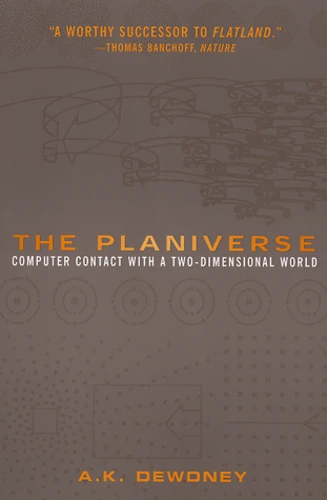The Planiverse.. Computer Contact with a Two-Dimensional World
Par :Formats :
- Paiement en ligne :
- Livraison à domicile ou en point Mondial Relay indisponible
- Retrait Click and Collect en magasin gratuit
- Réservation en ligne avec paiement en magasin :
- Indisponible pour réserver et payer en magasin
- Nombre de pages245
- PrésentationBroché
- Poids0.475 kg
- Dimensions15,5 cm × 23,5 cm × 2,0 cm
- ISBN0-387-98916-1
- EAN9780387989167
- Date de parution01/01/2001
- ÉditeurSpringer
Résumé
The year is 1981, and in the computer lab of a large university a group of graduate students and their professor are hard at work on the departmental mainframe, graphically modeling an imaginary two-dimensional world. The project is going well, extraordinarily well, when one student suddenly notices that the world they are building on-screen is... inhabited ! So begins AK Dewdney's tale of discovery and communication with the twodimensional civilization of Arde. Since its original publication in 1984, The Planiverse has developed a kind of cult readership, following in the footsteps of Edward Abbot's nineteenth-century classic Flatland. As a kind of mental puzzle or brain-teaser, it challenges and delights, inviting readers to imagine just how a two-dimensional world might actually work. But the book is also a fable, serving as a cautionary taie about the difficulties of communication from one totally alien world to another, and suggesting that it is not only Yendred and his fellow 2-D Ardeans who cannot imagine dimensions beyond those they see.
The year is 1981, and in the computer lab of a large university a group of graduate students and their professor are hard at work on the departmental mainframe, graphically modeling an imaginary two-dimensional world. The project is going well, extraordinarily well, when one student suddenly notices that the world they are building on-screen is... inhabited ! So begins AK Dewdney's tale of discovery and communication with the twodimensional civilization of Arde. Since its original publication in 1984, The Planiverse has developed a kind of cult readership, following in the footsteps of Edward Abbot's nineteenth-century classic Flatland. As a kind of mental puzzle or brain-teaser, it challenges and delights, inviting readers to imagine just how a two-dimensional world might actually work. But the book is also a fable, serving as a cautionary taie about the difficulties of communication from one totally alien world to another, and suggesting that it is not only Yendred and his fellow 2-D Ardeans who cannot imagine dimensions beyond those they see.



